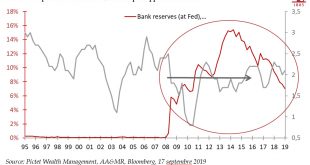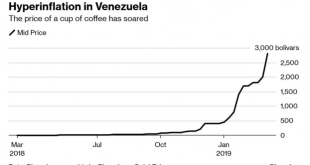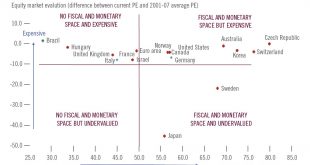There is nothing new under the sun Modern Monetary Theory, or “MMT”, has been getting a lot of attention lately, often celebrated as a revolutionary breakthrough. However, there is absolutely nothing new about it. The very basis of the theory, the idea that governments can finance their expenditures themselves and therefore deficits don’t matter, actually goes back to the Polish Marxist economist, Michael Kalecki (1899 – 1970). MMT as a centralisation tool MMT says that...
Read More »Debt, Deficits, and MMT
One of the American Economic Association sessions in this year’s ASSA Meetings focused on “Modern Monetary Theory” (MMT) and (maybe somewhat unfairly in the same session) on last year’s presidential address by Olivier Blanchard, which suggested that persistently low interest rates on public debt render government budget constraints non-binding. Greg Mankiw concluded in his paper that “MMT contains some kernels of truth, but its most novel policy prescriptions do not follow cogently from...
Read More »MMT, la nouvelle théorie en vogue à Washington
L’influence du ‘Modern Monetary Theory’ est susceptible d’augmenter dans les milieux économiques et politiques américains. La nouvelle théorie monétaire (Modern Monetary Theory/MMT), théorie macroéconomique défendue par des économistes hétérodoxes, commence à faire son chemin aux Etats-Unis. Cette théorie adopte une approche expérimentale de l’économie, basée sur la conviction fondamentale que la monnaie est créée par le gouvernement à travers les dépenses...
Read More »MMT, la nouvelle théorie en vogue à Washington
L’influence du ‘Modern Monetary Theory’ est susceptible d’augmenter dans les milieux économiques et politiques américains.La nouvelle théorie monétaire (Modern Monetary Theory/MMT), théorie macroéconomique défendue par des économistes hétérodoxes, commence à faire son chemin aux Etats-Unis. Cette théorie adopte une approche expérimentale de l’économie, basée sur la conviction fondamentale que la monnaie est créée par le gouvernement à travers les dépenses budgétaires, et non par les banques...
Read More »Modern Monetary Theory
This new theory is now in vogue in Washington DC, and its influence could grow.Modern Monetary Theory (MMT), a macroeconomic theory advocated by heterodox economists, is gaining traction in the US. The theory adopts an experimental approach to economics, underscored by the fundamental belief that money is created by the government via budget spending – and not via money creation by central and private banks, as per traditional theory.Proponents of MMT in the US interpret current low...
Read More »THE ROAD TO SERFDOM – BY THE EXAMPLE OF VENEZUELA – PART II
“Inflationism, however, is not an isolated phenomenon. It is only one piece in the total framework of politico-economic and socio-philosophical ideas of our time. Just as the sound money policy of gold standard advocates went hand in hand with liberalism, free trade, capitalism and peace, so is inflationism part and parcel of imperialism, militarism, protectionism, statism and socialism.” Ludwig von Mises, On the Manipulation of Money and Credit, p. 48 Claudio Grass (CG): We have all...
Read More »HAS Modern Monetary Theory ALREADY TAKEN HOLD IN WASHINGTON?
The interest in Modern Monetary Theory has grown as the limitations of ‘mainstream’ economic theories have become ever plainer to see since the financial crisis.Modern Monetary Theory (MMT) is a theory, initially emanating from left-wing US economists, that argues that since governments, and in particular the US government, issues its own currency, it can never run out of funding.The corollary is that it is possible for the government to spend more to push the economy towards its full growth...
Read More »Policy space may help only a few markets
Risk markets where there is room to loosen policy but are undervalued look more attractive than those where the authorities have room to manoeuvre but markets are expensiveAt this mature stage of the business cycle, it makes sense to consider the possible next steps in economic policy, given that we believe it is likely that central banks and governments will do their utmost to prop up the bull equity market as well as economic growth. (This will be especially true in the US as the 2020...
Read More »“Moderne monetäre Theorie: Ein makroökonomisches Perpetuum mobile (The Macroeconomic Perpetuum Mobile),” NZZ, 2019
NZZ, April 25, 2019. PDF. Modern monetary theory (MMT) is neither a theory, nor modern, nor exclusively monetary. I discuss fallacies related to MMT. Dynamic inefficiency requires permanent, not transitory, r<g. For now, policy makers should rely on common sense rather than MMT.
Read More »“Moderne monetäre Theorie: Ein makroökonomisches Perpetuum mobile (The Macroeconomic Perpetuum Mobile),” NZZ, 2019
NZZ, April 25, 2019. PDF. Modern monetary theory (MMT) is neither a theory, nor modern, nor exclusively monetary. I discuss fallacies related to MMT. Dynamic inefficiency requires permanent, not transitory, r<g. For now, policy makers should rely on common sense rather than MMT.
Read More » Swiss Economicblogs.org
Swiss Economicblogs.org



